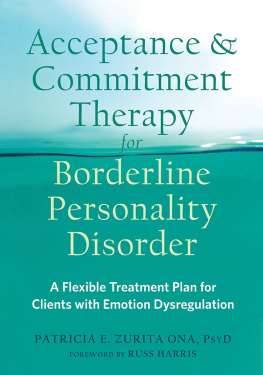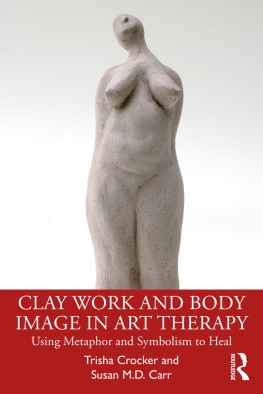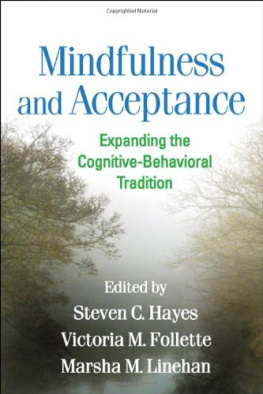Adria N. Pearson, Ph.D.,received her doctorate in clinical psychology from the University of Nevada, Reno, and completed her internship at the VA Long Beach Healthcare System. Pearson has presented at national conferences on the topic of body image and eating disorders and has written articles in peer-reviewed journals on mindfulness, acceptance, and trauma. She is currently a post-doctoral fellow at the VA Long Beach Healthcare System and lives in the greater Los Angeles area.
Michelle Heffner, Ph.D.,is a licensed psychologist in Nevada and coauthor of The Anorexia Workbook. She has written and developed professional book chapters, online continuing education courses, and peer-reviewed journal articles.
Victoria M. Follette, Ph.D., is Foundation Professor of Psychology at the University of Nevada, Reno, and a clinical scientist specializing in interpersonal violence and body image problems.
Foreword writer Steven C. Hayes, Ph.D., is University of Nevada Foundation Professor of Psychology at the University of Nevada, Reno. An author of thirty books and nearly 400 scientific articles, he has focused his career on understanding language and cognition functionally and applying this perspective to prevention and intervention, primarily acceptance and commitment therapy.

Body image dissatisfaction is particularly well-suited to an acceptance-based approach, yet there has been little to guide therapists in confronting this sensitive topic with their clients. I commend the authors for taking on this challenging issue and providing a clear-eyed yet empathic approach that is equally useful whether a clients concerns reflect primarily distorted perceptions, or, at least to some extent, more reality-based apprehensions regarding others potentially negative responses to their physical presentation.
Linda Craighead, Ph.D., professor of psychology and director of clinical training at Emory University in Atlanta, GA
After observing her for over a year in complex psychological settings, I have been impressed by how Adria Pearson walks the talk of acceptance and commitment therapy. She seems always to be ACT-consistent by embodying genuineness, honesty, and courage in all her actions. This book is just like that she knows the concepts well enough to express them in ways that are equally meaningful for both therapists and clients who struggle with body image dissatisfaction.
Kenneth D. Cole, Ph.D., director of training at the VA Long Beach Healthcare System

Publishers Note
This publication is designed to provide accurate and authoritative information in regard to the subject matter covered. It is sold with the understanding that the publisher is not engaged in rendering psychological, financial, legal, or other professional services. If expert assistance or counseling is needed, the services of a competent professional should be sought.
Distributed in Canada by Raincoast Books
Copyright 2010 by Adria N. Pearson, Michelle Heffner, & Victoria M. Follette
New Harbinger Publications, Inc.
5674 Shattuck Avenue
Oakland, CA 94609
www.newharbinger.com
All Rights Reserved
Printed in the United States of America
Acquired by Tesilya Hanauer; Cover design by Amy Shoup;
Edited by Jean Blomquist; Text design by Tracy Marie Carlson
Library of Congress Cataloging-in-Publication Data
Pearson, Adria N.
Acceptance and commitment therapy for body image dissatisfaction : a practitioner's guide to using mindfulness, acceptance, and values-based behavior change strategies / Adria N. Pearson, Michelle Heffner, and Victoria M. Follette.
p. cm.
Includes bibliographical references.
ISBN 978-1-57224-775-8 (hrdbk) ~~ ISBN 978-1-57224-788-8 ~~ (pdf e-book) ~~ ISBN 978-1-60882-724-4 (epub e-book)
1. Body image--Social aspects. 2. Acceptance and commitment therapy.
3. Self-acceptance. I. Heffner, Michelle. II. Follette, Victoria M.
III. Title.
BF697.5.B63P43 2010
616.89'1425--dc22
2009052767
To Dr. Linda Craighead, my undergraduate mentor at the University of Colorado at Boulder. Thank you for encouraging me to pursue this wonderfully rewarding career, including the joys of research, writing, and clinical practice.
ANP
This book is dedicated to all of my clients. My experiences with you inspired me as I worked on this book.
MH
For Laura and my friends, who teach me about love every day.
VMF
Dear Reader:
Welcome to New Harbinger Publications. New Harbinger is dedicated to publishing books based on Acceptance and Commitment Therapy and its application to specific areas of mental health. New Harbinger has a long-standing reputation in the mental health community as a publisher of quality, well-researched books. We offer an effectual forum for you to get this pertinent information to a wider audience.
As part of our commitment to publishing sound, scientific, clinically-based research, Steven C. Hayes, Ph.D., Georg Eifert, Ph.D., and John Forsyth, Ph.D., oversee all prospective ACT books for the Acceptance and Commitment Therapy Series. New Harbinger is at the forefront of publishing books that make ACT skills available to a trade and professional audience.
As ACT Series Editors, we review all ACT books published by New Harbinger, comment on proposals and offer guidance as needed, and use a gentle hand in making suggestions regarding content, depth, and scope of each book. We strive to ensure that any unsubstantiated claim or claims that are clearly ACT inconsistent are flagged for the authors so they can revise these sections to ensure that the work meets our criteria (see below) and is true to its roots (e.g., not passing off other models and methods as ACT).
Books in the Acceptance and Commitment Therapy Series:
- Have an adequate database. Those meant for the public will have at least one reasonably well-done and successful randomized trial showing that the methods are helpful.
- Be theoretically coherentthey will fit with the ACT model and underlying behavioral principles as they have evolved at the time of writing.
- Refrain from making excessive claims, and orient the reader toward unresolved empirical issues
- Not overlap needlessly with existing volumes
- Avoid jargon and the needless creation of new terms, or unnecessary entanglement with proprietary methods
- Keep the focus always on what is good for the reader
- Support the further development of the field
- Provide information in a way that is of practical use to readers
Sincerely,
Steven C. Hayes, Ph.D. Georg H. Eifert, Ph.D John Forsyth, Ph.D.
Foreword
How did it come to be? How is it possible that nearly 90 percent of adult women in our culture want to be thinner, and year after year the female physical ideal becomes thinner yet? Why are so many men more worried about their apparent muscle mass than about the quality of their character? How did it come to be that we find it harder and harder to live inside our own skin?
The acceptance and commitment therapy (ACT) model applies to a wide variety of human problems because it targets common core processes in psychopathology and psychological health. The negative processes ACT targets have never been so dominant; the positive targets never so needed. Through media and technology, we have created a culture that disproportionately favors a problem-solving, discrepancy-based mode of mind. Nowhere is this more obvious and more needlessly destructive than in the area of body image dissatisfaction. Our culture is smothering us with beautiful ideals and negative self-judgments. The verbal tools that evolved to analyze situations and to predict and compare possible outcomes of actions are being used instead to compare our body shape to an ideal, to detect our own anxiety and insecurity about our physical form, and to predict illusory forms of self-esteem to be found in yet another restrictive attempt to lose weight.













